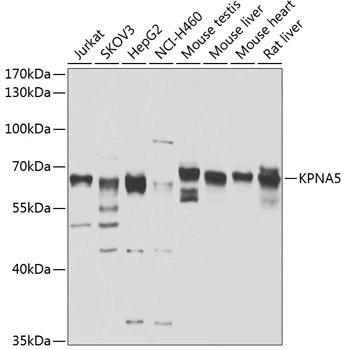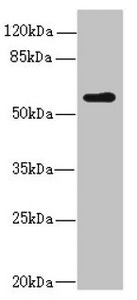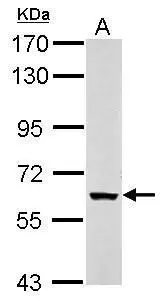
WB analysis of various sample lysates using GTX64797 KPNA5 antibody. The signal was developed with ECL plus-Enhanced. Dilution : 1:1000 Loading : 25μg per lane
KPNA5 antibody
GTX64797
ApplicationsWestern Blot
Product group Antibodies
ReactivityHuman, Mouse, Rat
TargetKPNA5
Overview
- SupplierGeneTex
- Product NameKPNA5 antibody
- Delivery Days Customer9
- Application Supplier NoteWB: 1:500 - 1:2000. *Optimal dilutions/concentrations should be determined by the researcher.Not tested in other applications.
- ApplicationsWestern Blot
- CertificationResearch Use Only
- ClonalityPolyclonal
- ConjugateUnconjugated
- Gene ID3841
- Target nameKPNA5
- Target descriptionkaryopherin subunit alpha 5
- Target synonymsIPOA6, SRP6, importin subunit alpha-6, importin alpha 6, karyopherin alpha 5 (importin alpha 6)
- HostRabbit
- IsotypeIgG
- Protein IDO15131
- Protein NameImportin subunit alpha-6
- Scientific DescriptionThe transport of molecules between the nucleus and the cytoplasm in eukaryotic cells is mediated by the nuclear pore complex (NPC) which consists of 60-100 proteins and is probably 120 million daltons in molecular size. Small molecules (up to 70 kD) can pass through the nuclear pore by nonselective diffusion; larger molecules are transported by an active process. Most nuclear proteins contain short basic amino acid sequences known as nuclear localization signals (NLSs). KPNA5 protein belongs to the importin alpha protein family and is thought to be involved in NLS-dependent protein import into the nucleus. [provided by RefSeq, Jul 2008]
- ReactivityHuman, Mouse, Rat
- Storage Instruction-20°C or -80°C,2°C to 8°C
- UNSPSC12352203





